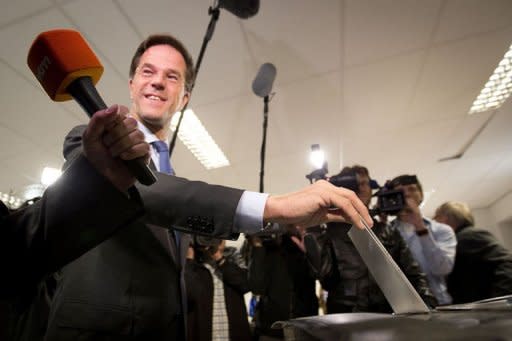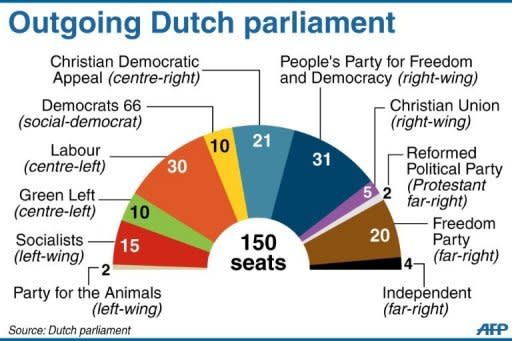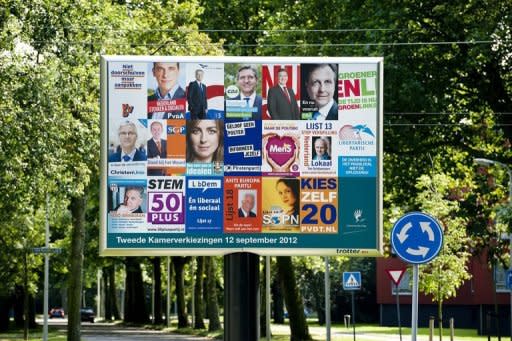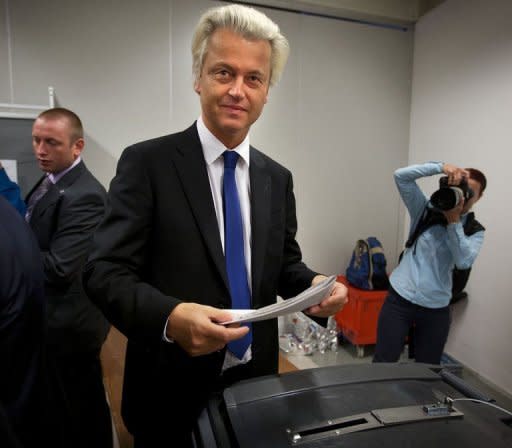Dutch vote in euro-dominated general election
The Netherlands voted in crunch polls Wednesday seen as a barometer of anti-European sentiment after a riveting campaign that has shaped into a tight race between two pro-Europe parties. The ruling Liberal VVD party of pro-austerity Prime Minister Mark Rutte and the Labour PvdA of rising star and former Greenpeace activist Diederik Samsom are battling it out for the top spot in the fifth election in 10 years. Polls predict that both parties will send around 35 MPs to the 150-seat lower house, with 19 other parties scrambling to be part of the eventual ruling coalition. Despite a campaign dominated by anti-Brussels rhetoric, the vote is expected to return a centrist coalition government that will remain committed to austerity and staying in the EU. And in a key ruling for the eurozone's future, the top court in neighbouring Germany approved a new European firewall for ratification by parliament that is seen as a crucial crisis-fighting tool. Fiscally prudent Rutte's government has been allied to German Chancellor Angela Merkel, while Samsom's calls for stimulus echo those of France's Socialist President Francois Hollande, elected this year on similar promises. Both parties have lashed out at the EU status quo during campaigning, but the Dutch export-based economy cannot afford to call into question membership in the bloc, where it sends 75 percent of its exports. Rutte voted at his former school in a chic neighbourhood of The Hague, vowing to stick to the path of austerity and threatening to cut aid to spendthrift southern nations. "We will continue with our close relationship with Germany and Finland in fighting the eurocrisis," Rutte told journalists, campaigning to the last for support from the countries over 12 million voters. "Greece and the others have to live up to their promises. And if not, we can't help them." Samsom voted early in nearby Leiden, the day after telling the campaign's final televised debate that: "It's a mistake to think that the crisis can be resolved by a choice between Paris or Berlin." Many in the eurozone's fifth-largest economy are fed up with bailing out indebted eurozone members while swallowing their own budget cuts but voters are expected nevertheless to shun anti-EU parties for the mainstream. "People say a lot of things during the campaign and then there's reality. Europe is important. It takes time," engineer Michiel de Haan, 30, told AFP as he voted at a train station in The Hague. "What's at stake is dealing with the crisis and I think that the Dutch are pragmatic, they won't vote for extremes," said civil servant Chris Schaapman, 44, as he voted before going to work. "The Netherlands' place in Europe won't change even if there are fewer pro-Europeans than a few years ago." Firebrand far-right leader Geert Wilders brought down the last government in April after refusing to approve an austerity-driven budget and his PVV party is expected to lose seats this time round as well as any shot at power. The PVV has switched its attacks from Muslims to Brussels, vowing to pull out of the euro and the EU itself if they come to power. But many Dutch voters and the political mainstream have decided that Wilders is simply unreliable. The hard-left, eurosceptic Socialist Party led by Emile Roemer surged in August but his popularity ebbed after Samsom seized the initiative in a string of televised debates during which Roemer was perceived as hesitant. Despite German fears of losing a key ally, whatever shape the new government of the traditionally frugal Netherlands takes it will stick to helping Merkel crack the austerity whip on the backs of indebted southern European nations. But even after Dutch exit poll predictions are announced shortly after polls close at 7 pm (1900 GMT), it will take weeks if not months for the new coalition to be formed.





